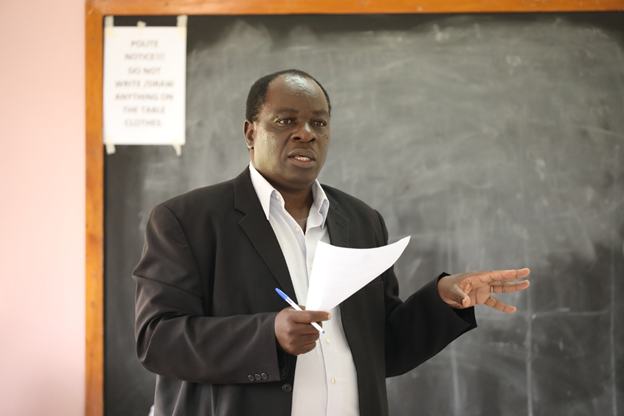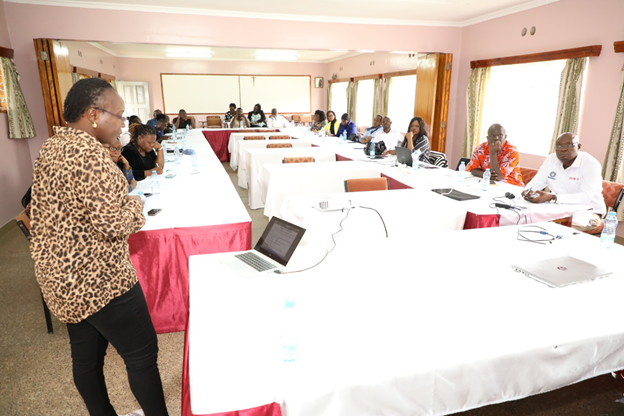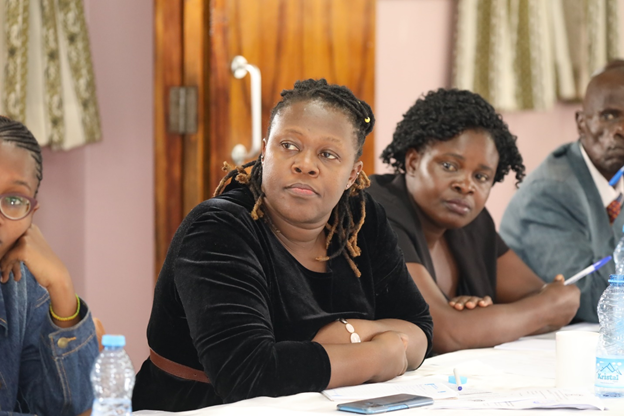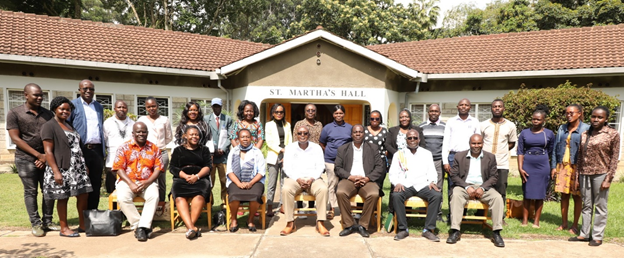The workshop participants at Bishop Nicholas Stam.
Researchers from MMUST have called for integrated approaches to address hygiene and sanitation in Western Kenya. The research dubbed ‘Assessment of Enabling Environment for Sanitation and Hygiene Service Delivery in Western Kenya’ is led by the Principal Investigator, Prof. Basil Ongor. The workshop was held on 23rd June 2023 at Bishop Nicholas Stam- Kakamega. This is one of the projects funded by the University Research Fund (URF).
The objective of the research is to create integrated models of sustainable service delivery for accelerated water and sanitation access in target counties and to improve complementary hygiene behaviors. The validation workshop brought together health and sanitation officers from Vihiga, Busia, and Kakamega Counties where the research was conducted.

The Principal Investigator, Prof. Basil Ongor addressing participants at the workshop.
The event was graced by the Director, Privately, Sponsored Student Programs, Prof. Benedict Alala (representing DVC, PRI). He was accompanied by the Director, Research and Postgraduate Support, Prof. Peter Bukhala, and the Registrar, of Planning Research and Innovation, Prof. Alice Ndiema. They encouraged the researchers to scale up their project to bring behavior change among communities in the Western region.
One of the key findings indicated that despite momentum at the national level, women and girls in Kenya continue to face significant challenges in adequately and safely managing their menstrual health and hygiene.
Speaking during the workshop, Prof. Ong’or noted that this is a pilot study to assess the feasibility of a multi-component intervention intended to improve sanitation and MHM hygiene in the Western region.
“In order to transform the sanitation and menstrual hygiene management (MHM) this project intends to invest in integrated and participatory ideas to leverage innovative and impact-oriented solutions in sanitation and Menstrual Hygiene Management (MHM),” he said.
The team also noted that the counties did prioritize MHM in their plans and they did not have strategies for the management of used menstrual products. They pointed out that there is a need to build capacity for the disposal of MHM products. In their way forward, they agreed to disseminate their findings to key stakeholders at the county level for a sustainable, transformative, and behavior change in sanitation and menstrual hygiene management.

Dr. Damaris Ochanda making a presentation during the workshop.
Notably, the other members of the research team included, Dr. Damaris Ochanda, Dr. Patricia Kariaga, and Dr. Edwin Kanda. The Research Assistants are Mr. Kevin Odhiambo, Ms. Valery Lutta, and Ms. Elizabeth Lusweti.
In her presentation titled ‘Holistic Approach to Menstrual Health and Hygiene’, Dr. Ochanda stated that sanitation has been neglected with the focus being on water service. “For effective Menstrual Hygiene Management (MHM), girls and women require access to Water, Sanitation, and Hygiene (WASH) facilities, affordable and appropriate menstrual hygiene materials, information on good practices, and a supportive environment where they can manage menstruation without embarrassment or stigma,” stated Dr. Ochanda.
Dr. Edwin Kanda alluded that in order to realize proper sanitation and MHM hygiene, county governments need to set ambitious targets, commit human and financial resources, and actively lead sanitation and hygiene programs.
“County governments must take the lead in prioritizing sanitation and hygiene in order to achieve Open Defecation Free (ODF) status,” said Dr. Kanda.

A section of the representatives for the three counties following the workshop proceedings.
The researchers are set to engage the key stakeholders in each of the counties to have a capacity-building engagement and share their findings for consideration in their plans. This will certainly improve sanitation and MHM hygiene in the region. Attaining adequate MHH requires access to three interconnecting elements which include Access to female-friendly facilities; Access to information and knowledge on sexual reproductive health; and Access to quality and affordable menstrual products.
By Linet Owuor and Lydia Anyonje
Photos by Shiundu Masafu





